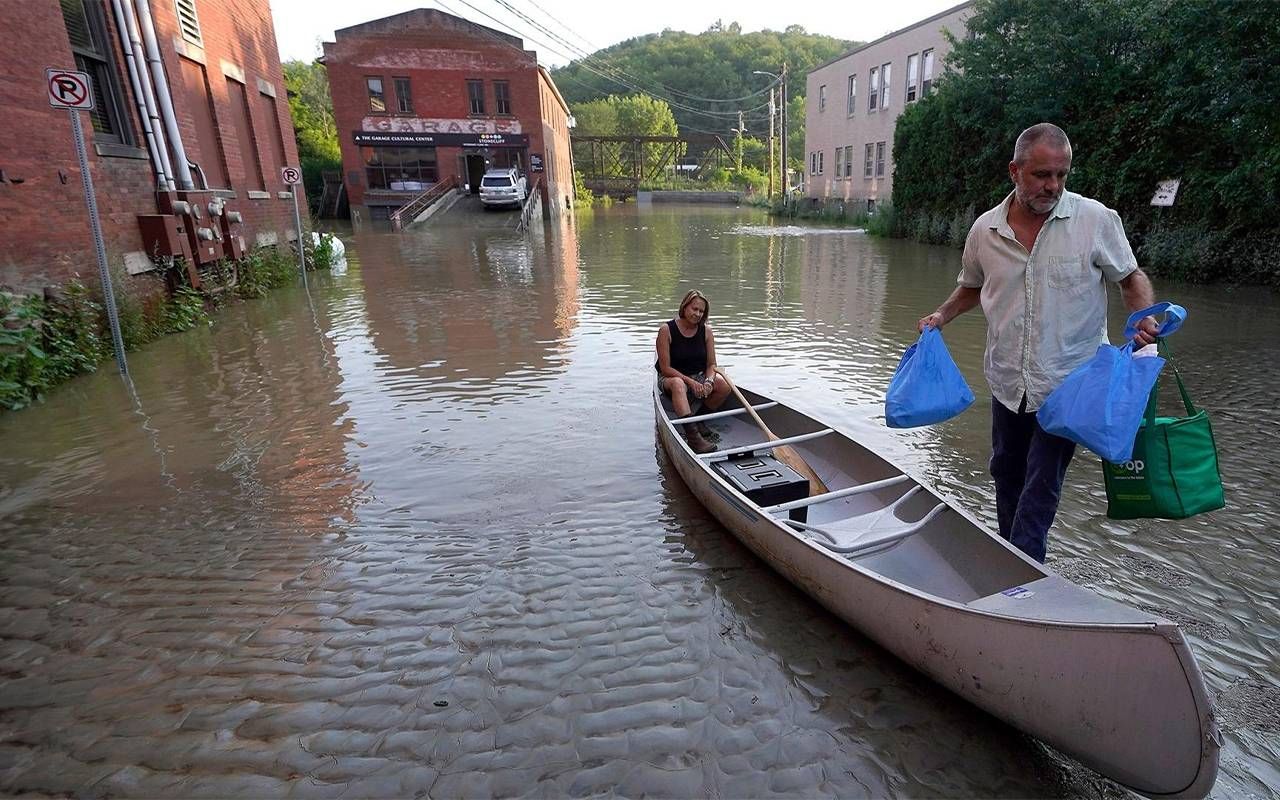The Mental Health Toll of Climate Change
From natural disasters, to extreme temperatures, to worry about the world, the climate crisis is intertwined with mental wellbeing
In early July 2023, floodwaters raged through central Vermont communities, inundating town centers and leaving neighborhoods covered in debris and mud. In the aftermath, Kate Reilly, Central Vermont Council on Aging's co-director of case management, observed the deep emotional impacts on community members the organization worked with.

Even now, eight months after the flood, the mud has been cleared and recovery is well underway. But for many older adults Reilly and her colleagues work with, the shadow lingers.
"Older adults are vulnerable populations to climate change and that's, a lot of times, forgotten."
"The larger mental health piece is just ever-present," says Reilly. "That fear, that worry — that's not going to go away, because people are waiting for this to happen again."
Intense storms, fast-moving wildfires and record-breaking heatwaves: the effects of the changing climate take myriad forms. Phenomena associated with the environmental crisis are entwined with mental health, from trauma from natural disasters, to psychological impacts of extreme temperatures, to heightened worry about the future of the world.
And while older adults are resilient in many ways in the face of the climate crisis, it also has multi-layered health and mental health implications for people later in life.
"Older adults are vulnerable populations to climate change and that's, a lot of times, forgotten," says Dr. Badr Ratnakaran, a geriatric psychiatrist at the Carilion Clinic-Center for Healthy Aging in Roanoke, Virginia, and member of the Climate Psychiatry Alliance.
As the number of people over age 65 grows in the US and around the world, it's important to understand ways that health and mental health are interconnected with climate change among older adults. "This problem is not going to go anywhere," says Ratnakaran. "It's kind of like the big elephant in the room."
'A Scary Place to Be'
In 2023, the US experienced a record-breaking 28 weather and climate disasters, from fires in Hawaii, to tornados across the Midwest and South, to flooding in the Northeast. Such disasters can be traumatic for people of any age, but there are ways that older adults are particularly vulnerable, according to Ratnakaran.
Physical health conditions can make it harder for them to prepare or to move to safety. Older people also might not be as connected to media, so may miss warning messages. In the wake of natural disasters, older adults may deal with post-traumatic stress disorder, depression and anxiety.
The mental toll of climate-related disasters can be powerful, as Reilly has seen among older adults in Central Vermont. One woman whose home was damaged in flooding a decade ago has had to evacuate multiple times in the years since because of risks from high waters.
"When we're feeling overwhelmed, it sometimes prevents us from being able to make any decisions."
The woman reports feeling a sense of panic every time it rains. "Which is just such a scary place to be," Reilly says, "wondering if this is going to be another storm, another time that you're going to have to grab your cat, evacuate."
The psychological effects of climate disasters can impact how people respond, according to Reilly. Among older adults whose homes were flooded in July 2023, many were daunted by the task of rebuilding, she says, but a shortage of affordable housing in the area limited their options for other living situations. The recovery process requires acting within certain timeframes to take advantage of funds and relief support, and that can be challenging for older adults to navigate.
"When we're feeling overwhelmed, it sometimes prevents us from being able to make any decisions," Reilly says.
The impacts of displacement and deaths linked to a disaster can have rippling effects through communities. Casualty rates tend to be highest among older people in natural disasters. During the 2018 Camp Fire in California, 71 of the 84 people who died were age 60 or older, and more than half of fatalities associated with Hurricane Katrina were over the age of 75. That can have lasting mental impacts on older adults who survive.
"They're losing their partners or family members of their same generation," says Ratnakaran, "so there's a lot of sense of loss of your social support."
Feeling Environmental Changes
Beyond major disasters, there are many other ways that environmental changes can impact mental wellbeing, according to Dr. Liat Ayalon, a professor in the School of Social Work at Bar Ilan University in Israel.
"It doesn't need to be a severe climate event," says Ayalon. "If it is very hot outside or very cold outside, I'm less likely to go out, I'm less likely to interact with people, and less likely to be physically active. All these things are going to affect my mental health as well."
Across all ages, higher temperatures are associated with higher rates of suicide; research finds that's true among adults over the age of 65, too. Factors like air pollution or shifts in pollen — climate change is making allergy seasons longer — also have implications for the wellbeing of older adults, who may be more sensitive because of underlying health conditions.
"Those things cause changes in the body physiologically," says Ratnakaran. "And health problems can contribute to decreased quality of life and psychiatric issues."
"If it is very hot outside or very cold outside, I'm less likely to go out, I'm less likely to interact with people, and less likely to be physically active."
Connecting Around Climate
The climate crisis has emotional implications, too, even for people who aren't feeling direct impacts. Often, the narrative around climate change lays blame on older generations, notes Ayalon.
"This entire discourse is very offensive and can cause people to feel shameful or to feel depressed about the situation," she says. That message can stop older people from getting involved in action around the climate crisis.
However, Ayalon says, research shows getting involved with climate action can have a lot of benefits for older adults. It can foster a sense of agency and purpose. Activism may involve physical activity, which can boost wellbeing. There's also a social element, she says, and an opportunity for intergenerational relationships.
"We do know that being connected to other people, young and old, and feeling like you are part of a society where age is not a barrier and does not distinguish between people is a good thing for people," she says.
In recent years, awareness has grown around "eco anxiety" and emotions related to climate change, which are particularly pronounced among young people. While studies on climate emotions of older adults thus far are limited, research is showing how people later in life are experiencing feelings like ecological grief — a sense of loss tied to environmental changes.
Ratnakaran says older people who have spent their lives in certain areas are concerned about changes in their surrounding environments. He hears from patients who are worried about the implications for their grandchildren.
Preparing for Climate's Mental Toll
As the impacts of climate change become more pronounced and the population ages, there's a need to better understand the implications for people of older ages, according to Ratnakaran.
Ratnakaran sees opportunity for medical providers to be aware of environmental factors impacting their older patients. That can include making sure that people have information that can help them survive extreme weather events — like knowing where cooling shelters are, having plans for when storms hit, and being well-stocked on supplies like food and medicine.
Reilly says the organization has been thinking about how to provide mental health supports in the face of climate change. In communities that have been hit by climate-related natural disasters, awareness of the mental impact is important in the response, she says, particularly among older adults who may also be dealing with factors like physical limitations and cognitive impairment.
"There has to be kind of a gentleness because we are working with people who have experienced trauma," says Reilly.


